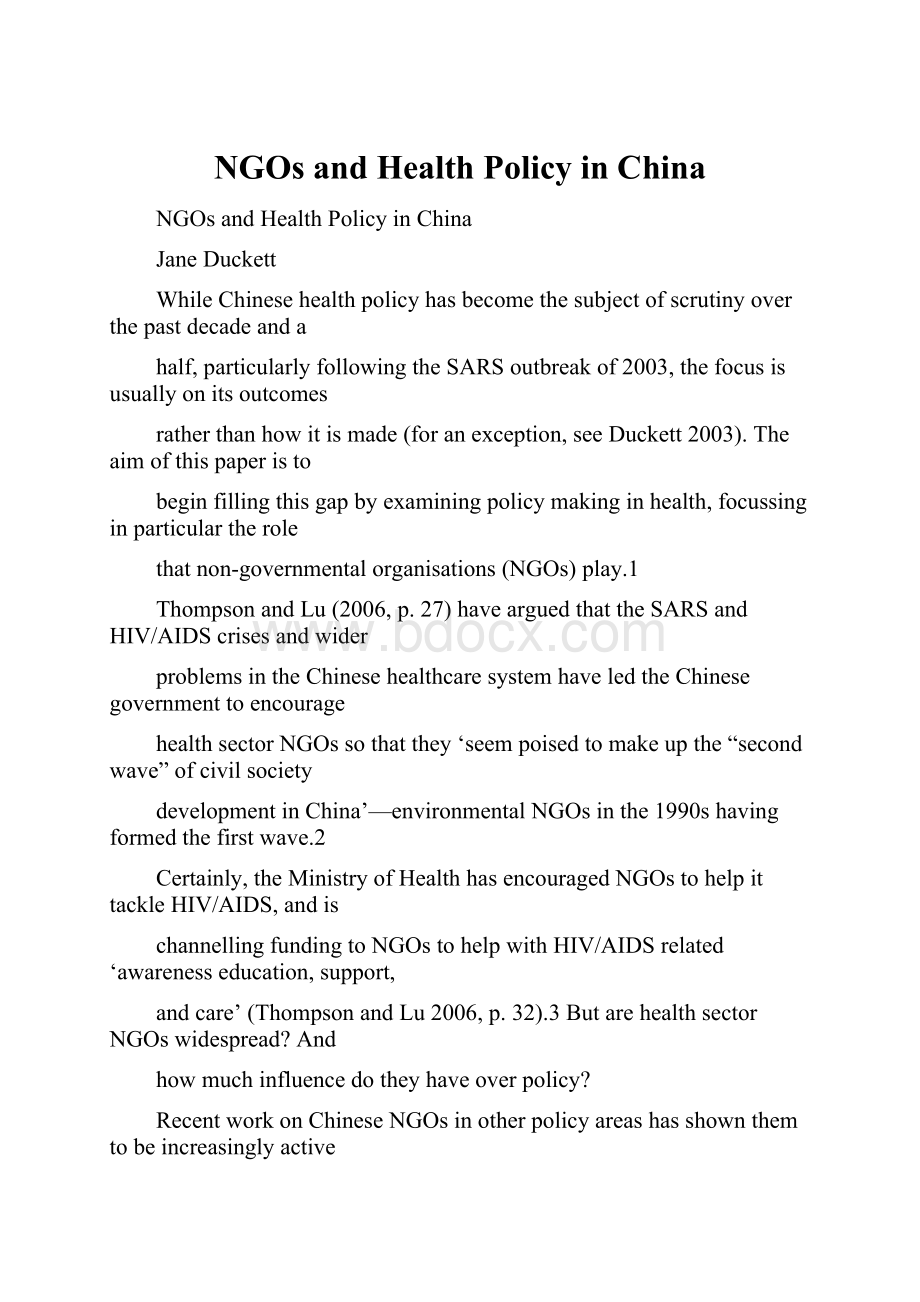NGOs and Health Policy in ChinaWord格式.docx
《NGOs and Health Policy in ChinaWord格式.docx》由会员分享,可在线阅读,更多相关《NGOs and Health Policy in ChinaWord格式.docx(29页珍藏版)》请在冰豆网上搜索。

channellingfundingtoNGOstohelpwithHIV/AIDSrelated‘awarenesseducation,support,
andcare’(ThompsonandLu2006,p.32).3ButarehealthsectorNGOswidespread?
And
howmuchinfluencedotheyhaveoverpolicy?
RecentworkonChineseNGOsinotherpolicyareashasshownthemtobeincreasinglyactive
andinfluential.Maargues,forexample,thatNGO‘actionshave…startedtoinfluence
governmentalpolicymakingandimplementation’(Ma2006,p.121).Thisisespeciallysoin
relationtosocialandenvironmentalissueswherethecentralgovernmenthasencouraged
themtotakeonsomeworkformerlyhandledbythestate(Curley2002;
Howell2004;
Yang
2005).SincetherehasbeensimilarrecentstateencouragementofNGOsinthehealthsector
1IwouldliketothankTheLeverhulmeTrustforfundingtheprojectthroughaLeverhulmeResearch
Fellowship,2006-2007.IwouldalsoliketothankXuYing,WangGuohuiandDanielHammondfor
theirveryvaluableresearchassistanceatvariousstagesofthisprojectaswellasthoseNGOmembers
whokindlyagreedtobeinterviewedbutwhoseidentitiescannotberevealedinthispaper.
2AndThompsonandLu(2006,p.36)suggestthata‘thirdwave’mightinvolveNGOsinthesphereof
environmentalhealthproblems.
3ThompsonandLu(2006)reportthatbothWuYi(Vice-PremierandthenMinisterofHealth)in
Spring2005)andGaoQiang(MinisterofHealth)onWorldAIDSday2005,havecalledforNGO
involvementinthefightagainstHIV/AIDS.
(seeaboveandPeople’sDaily,25June2004),these,toomighthavebecomeactiveandbe
influencing(ortryingtoinfluence)policy.
Studiesofhealthpolicy-makinginadvancedindustrialiseddemocraciesusuallyseea
particulartypeofNGO,themedicalprofessionalorganisation,asapowerfulinfluence
(Moran1999;
Tuohy1999).Associationsofmedicalprofessionalsoftenhaveatradeunionlike
role,representingmembersinterestsandnegotiatingontheirbehalfwithgovernments,
butalsosometimesmaintainingautonomythroughastrongprofessionalself-disciplinaryrole.
ForexampleintheUKtheBritishMedicalAssociationiseffectivelythetradeunionfor
doctors,whiletheRoyalCollegesrepresenttheinterestsofspecifichealthsectoremployees
(forexamplesurgeonsandnurses).TheUK’sGeneralMedicalCouncilisanotherselfregulatory
bodyformedicalprofessionals.Itregistersdoctorsforpracticeandmaintainsits
owndisciplinaryproceduresformedicalmalpractice,includingstrikingpractitionersfromthe
medicalregister(Ham1992).AlthoughinChina,theinfluenceofsuchorganisationswaned
inthe1950saftertheChineseCommunistPartytookpower,itasmayhavebeguntowax
againalongwiththoseofotherNGOsoverthelastdecade.Theseorganisationsinparticular
arethereforeworthstudying.
ThepaperisbasedonareviewofChinese(notinternational)healthsectorNGOsandindepth
studyofonegrassrootsorganisationandonegovernment-organisedNGO(GONGO),
anorganisationofmedicalprofessionals.4Thecasestudiesuseacombinationofdocumentary
materials(policydocuments,organisations’constitutionsandotherdocuments),organisation
websites,andinterviewswithNGOmembersandscholarsinChina,allcarriedoutin2006
and2007.5Ofcourseconclusionsbasedononlytwocasestudiescanonlybeindicativeand
arenotgeneralisabletoallhealthsectorNGOs.Furtherresearchisneededtodemonstrate
theirwiderapplicability.
ThelargestandfastestgrowinggroupofgrassrootshealthNGOsinChinaisactiveinthe
HIV/AIDSissuearea,andtherearerelativelyfewothers.Acrossissueareas,however,these
NGOsarenotonlybeginningtofillgapsinpublicsectorprovisionforsomeisolatedand
vulnerablesocialgroups,butarealsolobbyingforpolicychangeontheirbehalf.Sincetheir
capacitiesandchannelsforinfluencingpolicyremainlimited,theyusearangeofinformal
4Theprojectonwhichthispaperisbasedisstudyinginsomedepthalargernumberoforganisations,
butdata-gatheringandanalysisofothersisnotyetcomplete.
5Interviewshavebeenanonymisedtoprotectinterviewees’identities
channels,includingpersonalconnectionstoCPPCCorNPCrepresentativesanddoctors,and
themedia,aswellaspersistinginusingformalchannelssuchaswritingtoMinistersand
localgovernmentofficials.However,theirpersonalconnectionsarepoor(whencompared
withGONGOs),theiruseofthemediacanleadtoproblemswiththeparty-state,andformal
channelsoftenelicitlittleresponse.Theythereforehavelimitedoptionsattheirdisposal.
Sincepersonalconnectionsarepotentiallythemosteffectivewayofreachingpolicymakers,
grassrootsNGOsperhapshavemorepolicyimpactatlocallevel.
ResearchinotherpolicyareashasindicatedthatsomeGONGOs(includingso-called‘mass
organisations’thathaveparticularlyclosetiestotheparty-state),havedevelopedindependent
policystances(Howell2000).Ifind,however,thatmanyhealthsectorGONGOsremain
closelyconnectedtotheMinistryofHealth,havefewdiscerniblydistinctpolicypositions,
andaremainlyvehiclesforpolicyimplementation.Notably,medicalprofessional
organisations—thosethatyoumightfromcomparativeexperienceexpecttodevelopsome
autonomy—haveapparentlyfailedtodevelopanindependentstanceevenoverthecritical
issueofprofessionalself-regulation.Overall,theroleofNGOsislimitedinhealthbya
powerfulMinistryofHealth,eventhoughitseemsunabletoregulateprofessionalsand
deliverawiderangeofserviceseffectively.
NGOsandtheirrolesinChina
BasedonMartens,IdefineNGOsas‘independentsocietalorganisationswhoseprimaryaim
istopromotecommongoalsatthenationalorinternationallevel’(Martens2002,p.285).Ido
not,however,include,asshedoes,therequirementthattheybe‘formal’,withanemployed
staff.AsIshalldiscussbelow,inChinamanygrassrootsNGOsthatfulfilotherpartsofher
definitionarenotabletooperateformallybecausetheparty-statelimitstheirdevelopment
preventingthemfromformallyregisteringandopeningcorporatebankaccounts.Following
otherswritingonNGOs,‘civilsocietyorganisations’or‘societalorganisations’(shehui
tuanti)inChina(Cooper2006;
Yang2005),IdoincludeGONGOs,thatissocietal
organisationswithclosetiestotheChineseparty-state,sincetheyareformallyindependent.
TheexistingliteratureonChineseNGOshasshownthemtohaveawiderangeofroles.6
Whilesomehaveonlyasinglemainactivity,forexample,servicedelivery,othersmay
simultaneouslysustainmultipleroles.AtleastsevenNGOpolicy-relatedrolesoractivity
typeshavebeenidentifiedintheexistingliterature.First,thereis‘selfhelp’orservice
delivery/provisionthatfillsagapinstatepolicyandprovision,forexamplerunningschools
formentallyhandicappedormigrantchildren(Kwong2004;
Leung1994),orservicedelivery
thatisundertakenforgovernmentandisaformofpolicyimplementation(Ma2006).Second,
someNGOsdisseminateorcoordinatepolicy(Howell2004).Third,theycanprovidetraining
forofficialsandothers—oftentoimprovepolicyimplementation(Cooper2006;
Howell
2004).Fourth,NGOssometimesdisseminateresearchornewmodelsforinterventionsthat
thenshapepolicy(Howell2004).Fifth,theycanrespondtogovernmentconsultationsor
othergovernmentinvitationsforpolicyinput(Howell2004).Sixth,theycanmediatedisputes
orprovidelegalassistanceforindividuals(Cooper2006).Seventh,theycandirectlylobbyor
conduct‘advocacy’activitiesthatrangefromtheuseofpersonalconnections,notablythose
withCPPCCmembers,writingreportsorletterstorelevantgovernmentofficessettingout
recommendations,and‘awareness-raising’,oftenthroughthemedia(ChenandLiao2005;
Cooper2006;
Ma2006).Thefirstfiverolesarenon-confrontationalandgenerally
unthreateningtothestateeventhoughtheymayinvolveindirectattemptstoinfluencepolicy.
Thelattertwocanbemorecontentiousandpotentiallychallengepolicydecisions,pointto
lackofpolicy,orhighlightproblemswithexistingpolicies.
HealthsectorNGOs:
thegrassroots-GONGOdistinction
Thispaperdistinguishesprimarilybetween‘grassroots’NGOsandGONGOs.Grassroots
NGOsarethosethathavebeenestablishedvoluntarilyandspontaneouslybyindividualsor
groupsofpeopleandwithouttheinvolvementofgovernment.Theyareusuallyrelatively
smallintermsofpersonnelandadministrationandhaverelativelyfewresources.Theymay
beregisteredas‘societalorganisations’(shehuituanti),andthereforebeformallynot-forprofit.
Butsomearenotregisteredatallbecausetheyhavefailedtosecureasponsoring
departmentwithintheparty-stateadministrationordonotfulfiltherequirementsfor